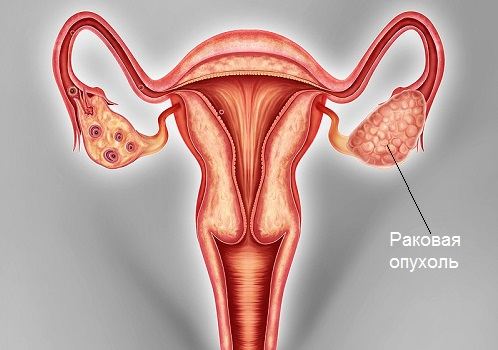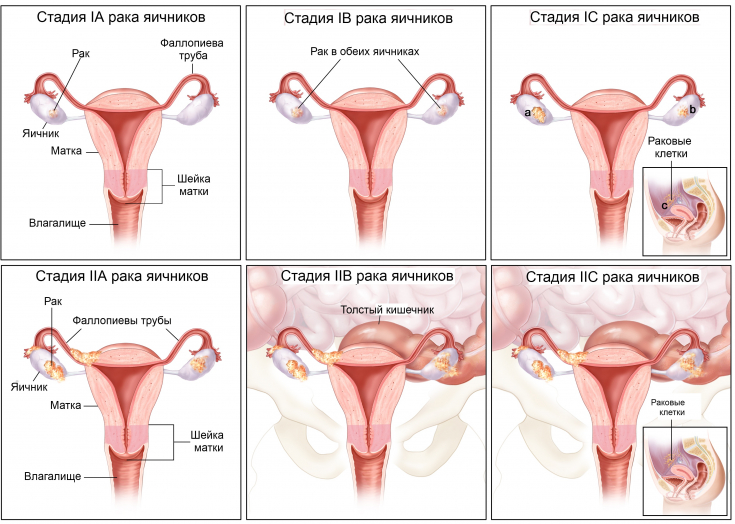Ovarian cancer — a disease whose name alone makes you shudder. Successful treatment in this case directly depends on early diagnosis. What are the signs of ovarian cancer? How to understand that you are in a risk group, and how to prevent disease? Is there an effective cancer prevention? The editors of estet-portal.com will tell about this.
- Ovarian cancer — risk factors for the development of the disease
- Signs of ovarian cancer to watch out for
- Diagnosis of ovarian cancer: how the disease is detected
- Prevention of ovarian cancer: how to protect yourself from dangerous disease
Ovarian cancer — risk factors for the development of the disease
Of course, it is impossible to give an unambiguous answer what exactly provokes the appearance of ovarian cancer. This disease is insidious and rather unpredictable. However, over many years of research, scientists and doctors have managed to establish several factors. They significantly increase the risk of ovarian cancer:
-
genetic predisposition — if one of your close relatives has been diagnosed with cancer of the ovaries or other organs, then the risk increases;
-
too early or vice versa late onset of the first menstruation;
-
deviations at beginning of menopause — very late or early;
-
hormonal problems;
-
hormone therapy;
-
taking hormonal contraceptives without supervision and appointment of a doctor;
-
bad habits — smoking, passive lifestyle, drinking alcohol, unhealthy diet.
-
diagnosed with endometriosis and uterine fibroids.

Any of these features — a reason to more carefully monitor your health, visit a doctor more often, be examined. And, of course, it is in your power to change your lifestyle by giving up bad habits.
Read also: Breast and ovarian cancer genetic testing: who should do it
Signs of Ovarian Cancer: Pay Attention
Early diagnosis of cancer — one of the keys to recovery. Therefore, it is important to notice the signs of ovarian cancer as soon as they appear. And don't ignore them, don be afraid to go to doctor. In this case, it is better to play it safe by excluding a dangerous disease than to miss it.
Signs of disease:
-
menstrual cycle failure, its irregularity;
-
weight loss with simultaneous increase in abdominal volume;
-
small but regular nausea;
-
loss of appetite;
-
fatigue and weakness;
-
frequent urge to urinate with small amount of urine itself;
-
feeling full or bloated, constipation, bowel discomfort;
-
pain in the lower abdomen of a pulling nature;
-
painful intercourse.

If you notice these signs of ovarian cancer and they are not due to treatment or lifestyle changes, don slow going to doctor. First, contact a general practitioner or gynecologist. The doctor, based on the symptoms and the initial examination, will refer you to the research to the right specialist.
Read also: Ovarian cancer — symptomless disease
Diagnosis of ovarian cancer: how the disease is detected
The diagnosis of ovarian cancer requires an integrated approach. It is impossible to determine whether there is a disease, only on the basis of a single analysis or ultrasound.
The specialist will prescribe the following types of examinations for you:
-
Analysis for tumor markers. An elevated concentration of a marker such as CA-125 indicates a disease. However, at the first stage, not everyone has this, but at the second — in 90% of cases.
-
Ultrasound of the pelvic organs — allows you to determine the exact location of the formation, see its size.
-
MRI & CT — help not only to see the tumor, but and the presence of metastases.
-
PET-CT — one of the most accurate diagnostic methods.
-
Biopsy — it is necessary for an accurate diagnosis.
The study will require the use of several methods to understand whether the formation is malignant, at what stage of development it is.
Read also: Tea may reduce the risk of ovarian cancer
Prevention of ovarian cancer: how to protect yourself from dangerous disease
Any disease is better to prevent than to cure. Of course, no one is 100% insured against cancer, but there are a number of measures that significantly reduce its risk:
-
visit your gynecologist regularly — a couple of times a year, do an ultrasound of the pelvic organs;
-
any diseases of the genitourinary system should be treated in accordance with recommendations of the doctor and under his supervision;
-
contraceptive and any hormonal therapy should only be with authorization and under the control of a doctor.
-
healthy lifestyle — basis of well-being.
-
give up bad habits, pay attention to sports and mental health.
And if among your relatives someone had cancer, you should even more closely monitor your health, undergo preventive examinations.
Remember that when ovarian cancer is found in the first stage, the chance of recovery is 90%. And here 4 stage gives only 1.5% chance. Therefore, the signs of ovarian cancer cannot be ignored — immediately go to doctor.
Read also: Ovarian cancer treatment: what methods are used today
You might be interested in: Abs Workouts.






Add a comment